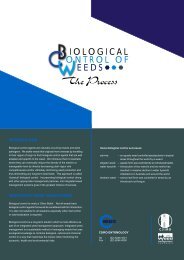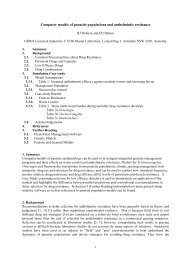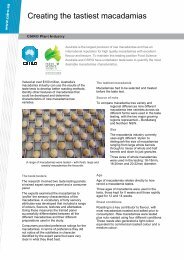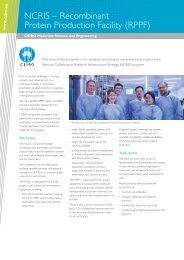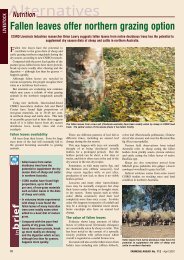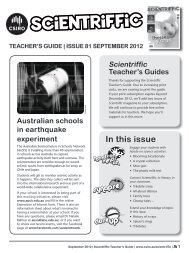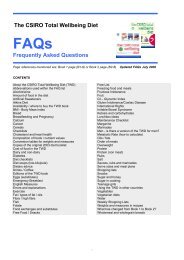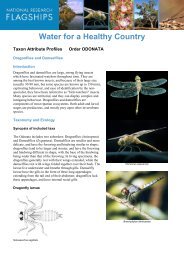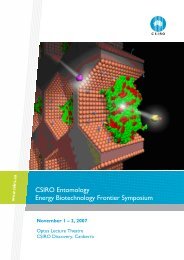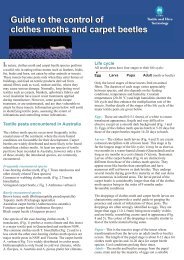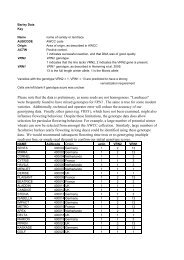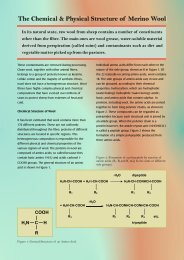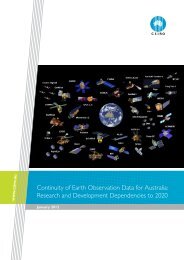WfHC - cover page (not to be used with pre-printed report ... - CSIRO
WfHC - cover page (not to be used with pre-printed report ... - CSIRO
WfHC - cover page (not to be used with pre-printed report ... - CSIRO
Create successful ePaper yourself
Turn your PDF publications into a flip-book with our unique Google optimized e-Paper software.
As a result of such conditions, at Oriners the cattlemen would pursue the opposite strategy<br />
from one on the Coleman descri<strong>be</strong>d by Philip (early wet season fires and wet season<br />
mustering). At Oriners they would burn at the end of the wet season (2.6.3) <strong>to</strong> encourage<br />
regrowth and concentrations of cattle in the early dry, the do the main mustering <strong>be</strong>tween<br />
May and Oc<strong>to</strong><strong>be</strong>r, depending on the season.<br />
Oriners was largely des<strong>to</strong>cked when it was sold <strong>to</strong> the Kowanyama people, and aside from<br />
some mustering activity in the late 1990s, cattle have <strong>be</strong>en allowed <strong>to</strong> wander and breed<br />
freely. The current num<strong>be</strong>r of cattle on the property is unknown, and an estimate of their<br />
num<strong>be</strong>rs and/or additional mustering effort may <strong>be</strong> a useful exercise <strong>to</strong> undertake in the<br />
coming years. What is <strong>not</strong>iceable in the above section is how human residence was heavily<br />
tied <strong>to</strong> the seasonal location and <strong>pre</strong>sence of cattle on the landscape. This relationship has<br />
effectively <strong>be</strong>en decoupled since 1990, <strong>with</strong> cattle no longer <strong>be</strong>ing the main priority in human<br />
<strong>pre</strong>sence. Instead, road access is the primary determinant of where human <strong>be</strong>ings are in the<br />
landscape, and the motivations for that <strong>pre</strong>sence include through-traffic, NRM work and<br />
recreational pig hunting and fishing.<br />
2.6.3 Fire regimes<br />
Fire management at Oriners requires careful attention <strong>to</strong> the timing, location, intensity, and<br />
purpose of the fire. Many fires are accidentally lit, but fire management by Indigenous people<br />
is one of the most well known forms of Indigenous land management, and was an important<br />
part of cattle management and mustering. Strang (1997: 89) descri<strong>be</strong>s how Indigenous<br />
people ex<strong>pre</strong>ss concern when country remains unburnt for several years, thereby <strong>be</strong>coming<br />
„wild‟ and „dirty‟ and vulnerable <strong>to</strong> hot bush fires. The following comments relate <strong>to</strong> both past<br />
and <strong>pre</strong>sent fires and uses of fires at Oriners:<br />
The grass, [when] the grass starts drying up, that‟s it. The wet is nearly over. That is when<br />
we are supposed <strong>to</strong> start burning. When it‟s still got a lot of moisture so the grass can grow<br />
back again.<br />
Philip Yam<br />
---------------------------------------<br />
Cecil Hughes: The sand ridge country is very poor but if you burn the country at the right<br />
time you get the regrowth and it takes the cattle through the winter months anyway.<br />
Marcus Bar<strong>be</strong>r: So what is the right time?<br />
Cecil Hughes: It depends on when the wet finishes. As soon as the country will burn, you<br />
get out there and burn it. As soon as the fire will do it and you can control your burn,<br />
<strong>be</strong>cause if you do it at the right time, the fires go out at night. So you can burn a certain<br />
area and know it will go out at night [<strong>be</strong>cause] there‟s dew and that country is still half<br />
green. If a creek goes down there, you burn this side of the creek [and] you know it won‟t<br />
go across. If you leave it <strong>to</strong>o late it will jump the creek and keep going.<br />
Marcus Bar<strong>be</strong>r: Are there other things that you needed <strong>to</strong> do each year <strong>to</strong> keep that country<br />
going, <strong>to</strong> keep it healthy?<br />
Cecil Hughes: The key <strong>to</strong> it is <strong>to</strong> burn at the right time, that‟s the main thing.<br />
---------------------------------------<br />
Marcus Bar<strong>be</strong>r: Were there still fires burning when you arrived [at Oriners homestead] or<br />
was it <strong>to</strong>o late for the fires?<br />
Ezra Michael: Too late for the fires. We could <strong>not</strong> burn it, the grass was all dry. When I got<br />
there, sometime in the winter, June or July somewhere around June I think, the grass was<br />
there. There was burning grass, <strong>not</strong> round the [station] a long way out. Out on the cattle<br />
yards where we were mustering- Jewfish yard, Bull yard, Horseshoe,<br />
Working Knowledge at Oriners Station, Cape York<br />
109



